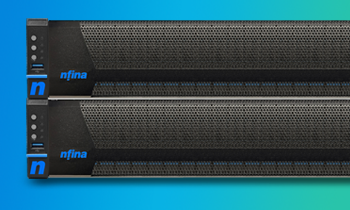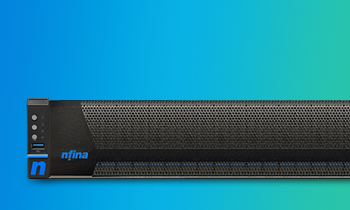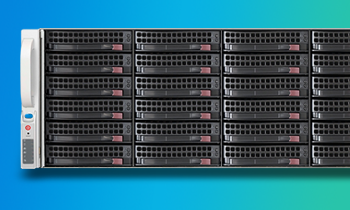Unified Storage Solutions
supporting multi-protocol unified storage, file storage and block storage data types

SAN Solutions
Nfina SAN devices are capable of taking unlimited snapshots, locally and remotely, with no single point of failure assuring your business data is secure. They are a high-availability solution for redundant hybrid cloud, on-premise storage, backup, disaster recovery, and virtual environments.

NAS Solutions
Offering redundancy for backup, disaster recovery, or business continuity, Nfina NAS solutions are ideal for an all-flash storage array or for creating storage pools in a HA cluster. In hyperconverged, virtualized systems, or AI environments, Nfina NAS deliver on performance and efficiency.

JBOD Solutions
Designed for maximum storage capacity Nfina’s JBOD solutions provide an easy way to add incremental storage to existing storage networks. Nfina JBODs are also a nice compliment to our hybrid cloud solutions. Usually up to six JBODs can be added to your network allowing you to add storage as the need arises.
What is Unified Storage at Nfina?
Data storage is the practice of storing digital data. Nfina’s unified storage solution systems include SAN, NAS, JBOD, Hybrid Cloud Storage, and Cloud Storage, which contain hard disk drives, solid-state drives, optical disks, tapes, etc. Nfina offers a hierarchy of solutions, from entry-level to advanced, depending on the amount of data, the performance, speed, and the number of people accessing the data. We support multi-protocol storage solutions, file storage, and block storage data types. All storage devices purchased or leased include consulting, 24/7 tech support, and a standard five-year warranty.
Show More
- SAN (Storage Area Network) is a data storage network that provides access to data through a network. The benefits of using a SAN include improved storage scalability, improved performance, and better data security and availability. SANs provide redundancy by replicating data across multiple disks on multiple servers. SANs typically use a block-level digital data type to access and store data but at Nfina our SANs support storage solutions. In today’s IT environment with data growing exponentially, it only makes sense to have versatility in how your data is stored. Check out examples of our SAN Storage prices.
- NAS(Network Attached Storage) is a device that enables users to store and access data from any connected device over a network. Using a NAS improves data security and access, enhances collaboration, and offers greater scalability. NAS devices typically us a file storage or tree structure for storing digital data, which is organized in files and nested folders. But at Nfina, our NAS devices support this storage unity. Storage adaptability is key since most business need to store and access data using multiple protocols.
- JBOD (Just a Bunch of Disks) is a storage configuration where multiple disks are connected directly to a server. A JBOD allows you to combine disks to create a larger, more powerful storage solutions. Multiple JBODs can be linked together as your data usage increases.
- Hybrid Cloud Storage allows data to be stored on-premise and in multiple locations in the cloud for complete redundancy. Choosing the hybrid cloud approach offers more control and security of on-premise devices, with the cost effectiveness and greater scalability of cloud storage. An example of our hybrid cloud solution would be combining a NAS and multiple SANs, on-premise and in the cloud, using a multi-protocol data type. Management and monitoring of the networks would occur using our Nfina-Store and Nfina-View software.
- All of Nfina storage and hyperconverged data storage systems support structured and unstructured data types. So, what is the difference?
- Structured Data Storage
- organizes data in a database. Examples include relational, object, and distributed databases.
NFS (Network File System) and SMB/CIFS (Server Message Block/Common Internet File System) are structured data protocols used to access files over a network. Some benefits of using NFS and SMB/CIFS include improved data sharing and access, faster data transfer speeds, and increased data security.
- Unstructured Data Storage Solutions are a way of storing data without any specific structure. Examples of unstructured data storage include images, text, audio, and video files.
- Additional data storage types supported include application data storage, multi-protocol unified storage, block storage, file storage, and more.
Unified storage supports multiple systems and protocols, typically SAN for block and NAS for file, and has since expanded to include cloud platforms. It also includes physical and virtual servers accessed over a shared network. Nfina also uses these storage solutions in its Hybrid Cloud solutions.
Unified storage comes in three types, each with its own unique features and benefits. The first type is block-based, which is best suited for applications that require fast data transfers such as databases and virtual machines. Block-based storage uses iSCSI or Fibre Channel protocols to transfer data between the storage system and the host. The second type is file-based. File-based systems are ideal for organizations that need to store large amounts of unstructured data such as word documents, images, audio files, videos, among others. These systems use NFS or CIFS/SMB protocols to read/write files on the network file system. Object-based storage is designed for organizations that need a scalable solution capable of managing vast amounts of unstructured data efficiently. This type uses S3-compatible APIs (application programming interfaces) instead of traditional file- or block-level access methods like NFS or SMB/CIFS. Each type has its strengths based on specific business requirements with varying scalability options from small businesses to enterprise level solutions adapted for high-performance computing environments where petabytes are an essential element in their architecture. Companies should evaluate carefully what kind they need before acquiring one so they can enjoy all advantages provided by this technology innovation.
The benefits of these data services are price, scalability, and the ability to access and run all workloads at peak performance on a single storage system. Another benefit is increased efficiency and flexibility. With this, organizations can easily allocate resources in real-time based on their changing needs, allowing for easier management and optimization of their data. Moreover, it simplifies maintenance and upgrades since there’s only one system to manage. This means less time spent on administrative tasks and more time focused on strategic initiatives that drive business growth. Additionally, with its ability to support both block- and file-level access protocols, SMB unified storage solution offers enhanced compatibility with various applications that require different types of data access. Adopting a unified approach to storing data offers numerous benefits that help organizations improve productivity while reducing costs in the long run.
So, what is the difference between unified storage architecture and traditional storage? Unified storage is a modern approach that differs significantly from traditional storage. Unlike traditional storage, which separates block and file-level data into distinct structures, unified storage consolidates both types of data in a single platform. This makes it easier for administrators to manage the entire infrastructure. In addition to its simpler management structure, it offers several advantages over traditional systems. First and foremost, it allows businesses to be more flexible with their IT resources by sharing resources between applications and workloads. Another benefit is its ability to provide increased performance levels while reducing costs. By consolidating different forms of data on one system rather than maintaining separate ones for each type, businesses can reduce hardware requirements and optimize resource utilization. While traditional storage has been used successfully for many years, the rise of big data analytics has made it increasingly challenging to manage efficiently. This technology provides an alternative solution that delivers better performance at lower costs while simplifying administration tasks through consolidation capabilities. The differences between unified storage and traditional storage are significant enough that businesses should carefully evaluate their options before making any decisions about how they store their critical information assets. All storage offerings from Nfina (SAN, NAS, HCI-HA, and Hybrid Cloud) support the unified storage digital type. Check out our Unified Storage System white paper for more information and to learn about unified storage system fundamentals.
- Structured Data Storage
Advantages of Unified Storage
The unified storage solution architecture is a powerful tool that combines different types of storage into a single, centralized system. This means that instead of having separate storage systems for different types of data, such as files, documents, and images, businesses can now store all their data in one place. This has numerous benefits for businesses looking to streamline their workflows and optimize performance.
Show More
1. Increased Flexibility and Scalability: One of the biggest advantages of unified storage is its flexibility and scalability. As businesses grow and their storage needs increase, they can easily add more capacity without disrupting their current operations. Unified data storage allows for seamless expansion by simply adding more disks or nodes to the existing system. This eliminates the need for multiple individual storage systems that require constant maintenance and upgrades.
2. Cost Savings: By combining all types of data into one centralized system, businesses can save on hardware costs as well as reduce IT management expenses. Rather than investing in several separate storage solutions, this unified storage architecture reduces both upfront and long-term costs by providing a single platform for all data needs.
3. Simplified Data Management: Having multiple siloed systems often leads to complex data management processes which can be time-consuming and error prone. With these data services, businesses have a single interface to manage all their data across various platforms – from on-premises servers to cloud-based applications. This simplifies daily tasks such as backup and recovery, archiving, and disaster recovery.
4. Enhanced Data Protection: Data security is crucial for any business regardless of its size. These flexible storage solutions offer advanced data protection features such as built-in redundancy, data encryption, and disaster recovery capabilities. This ensures that data is safe from cyber threats and can be easily restored in the event of a disaster.
5. Improved Performance: Unified storage offers high-performance capabilities by combining the speed of flash-based storage with the capacity of traditional disk-based storage. This allows businesses to run applications and access data quickly, improving overall productivity.
6. Ease of Integration: Unified storage seamlessly integrates with existing IT infrastructure, making it easier for businesses to adopt and manage. It also supports multiple protocols such as NFS, SMB, iSCSI, and Fibre Channel, allowing businesses to use their preferred method for accessing data.
7. Better Data Accessibility:
With flexible storage solutions, all types of data are stored in one location, making it easy for employees to access the information they need quickly and efficiently. This promotes collaboration and improves overall workflow within the organization.
Unified storage offers numerous benefits for businesses looking to streamline their data management processes while reducing costs and improving performance. By centralizing all types of data into one system, unified storage makes it easier for businesses to scale as they grow without compromising on security or accessibility.
Let’s dive into the Storage System fundamentals below.
Cost Effectiveness
Cost-effectiveness is a crucial factor for any business looking to maximize its resources and optimize its performance. In today’s competitive market, companies are constantly seeking ways to streamline their workflows and cut costs without compromising on the quality of their products or services. This is where unified storage comes in as a powerful solution that can significantly impact a company’s cost-effectiveness.
Show More
Unified storage refers to a single storage system that can handle different types of data, such as files, blocks, and objects. This means that instead of having separate systems for each type of data, businesses can consolidate all their data into one centralized location. By doing so, they eliminate the need for multiple hardware and software components, which ultimately reduces costs associated with maintenance and management.
One of the primary reasons why object unified storage is cost-effective is because it simplifies IT infrastructure. With traditional storage solutions, companies have to invest in various hardware and software components from different vendors. This not only incurs high initial costs but also requires ongoing maintenance expenses. On the other hand, object storage streamlines this process by offering a single platform for all data needs. As a result, businesses can save significant amounts on hardware purchases and reduce the overall complexity of their IT infrastructure.
Moreover, unified storage offers scalability at much lower costs compared to traditional solutions. As businesses grow and generate more data, they often need to upgrade or expand their existing storage systems to accommodate it all. However, with traditional solutions like direct-attached storage (DAS) or network- attached storage (NAS), scaling can be a costly and time-consuming process. In contrast, unified storage allows for easy scalability by simply adding more drives or storage capacity to the existing system, without disrupting operations or incurring large expenses.
Another cost-saving aspect of unified storage is its efficient use of resources. With traditional solutions, businesses often have separate storage systems for different types of data, resulting in underutilization of resources. Object storage eliminates this issue by efficiently allocating resources based on data needs and requirements. As a result, companies can optimize their hardware usage and reduce costs associated with idle or underutilized resources.
Aside from these direct cost savings, unified storage also offers numerous benefits that indirectly impact a company’s cost-effectiveness. These include improved data management and organization, faster access to data, enhanced data protection and disaster recovery capabilities, and simplified backup processes. All these factors contribute to increased productivity and efficiency within an organization through object storage, ultimately leading to better overall performance and cost-effectiveness.
In conclusion, there are several advantages that make it a highly cost-effective solution for businesses of all sizes. By simplifying IT infrastructure, reducing hardware and maintenance costs, providing scalable options at lower expenses, and optimizing resource utilization, it can significantly impact a company’s bottom line.
Streamline Workflows

“ I’m enthralled with the level of service we receive. Nfina has more than proven their willingness and ability to help us with support as well as sales”
– George Passantino
IT Operations Supervisor, Clear Rate Communications
Streamline Workflows
Unified storage technology is a powerful tool that can greatly streamline workflows and improve overall business performance. In this section, we will dive deeper into how these solutions streamline workflows and the specific benefits it brings to businesses.
Show More
1. Centralized Storage Solution: One of the main ways unified storage streamlines workflows is by providing a centralized and flexible storage solution for all data types and formats. This means that instead of having multiple different systems for different types of data, everything can be stored in one place, making it easier to access and manage. This eliminates the need for employees to waste time navigating between various systems to find the information they need, resulting in increased productivity and efficiency.
2. Simplified Data Management: With this, businesses no longer have to deal with storage management of multiple disparate systems for different types of data such as structured and unstructured data, file shares, databases etc. Instead, all these forms of data are consolidated into a single platform which simplifies data management processes. This not only saves time but also reduces complexity and minimizes the risk of human error when handling large amounts of data.
3. Enhanced Collaboration: Collaboration is an essential aspect of any business workflow. With this, collaboration becomes much more seamless as all team members have access to the same central repository of information. They can easily share files, collaborate on projects in real-time without worrying about compatibility issues or version control problems that may arise when using multiple systems.
4. Improved Performance: Having all your data stored in one place also means that it can be accessed and processed more efficiently. Unified storage uses advanced technologies such as data tiering and caching to optimize data access and deliver faster performance. This is especially beneficial for businesses dealing with large amounts of data that require quick processing.
5. Cost Savings: Unified storage can also result in cost savings for businesses. With a centralized storage solution, there is no need for separate licenses, hardware, and maintenance costs associated with managing multiple systems. This can significantly reduce IT expenses and free up resources to be invested in other areas of the business.
6. Better Data Protection: Data protection is crucial, particularly in today’s digital landscape where cyber threats are ever-increasing. Unified storage offers built-in data protection features such as data encryption and snapshot capabilities to safeguard critical business information. Additionally, having all data stored in one place simplifies backup and disaster recovery processes, making it easier to ensure business continuity.
7. Flexibility and Scalability: Unified storage offers flexibility and scalability to meet the changing needs of businesses. As companies grow, their data requirements increase as well. It allows businesses to easily scale their storage capacity without disrupting workflows or causing downtime.
Data Protection
Data protection is a critical aspect of any business, as the loss or exposure of sensitive data can have severe consequences. With the ever-increasing amount of data being generated and stored by businesses, it has become essential to have robust data protection measures in place. This is where unified storage comes into play.
Our systems are designed to streamline workflows and optimize performance while also providing advanced data protection features. These systems integrate various storage technologies such as block, file, and object-based storage into a single platform, making it easier for businesses to manage their data. Let’s take a closer look at how these solutions empower businesses with its advanced data protection capabilities.
Show More
1. Data Encryption:
One of the most crucial aspects of data protection is encryption. Our storage systems offer built-in encryption features that protect sensitive information from unauthorized access. This is especially important for companies that deal with highly sensitive data, such as financial or healthcare institutions.
With these solutions, businesses can encrypt their entire dataset or specific files and folders using industry-standard algorithms like AES 256-bit encryption. This ensures that even if an unauthorized person gains access to the physical drives or network infrastructure, they will not be able to read the encrypted data without the decryption key.
2. Data Replication:
In today’s fast-paced business environment, downtime can result in significant losses for organizations. Unified storage provides high availability through synchronous or asynchronous replication options, ensuring continuous access to critical business information even during system failures.
Synchronous replication creates an exact copy of the primary data on the secondary system in real-time, ensuring zero data loss in case of a failure. Asynchronous replication, on the other hand, replicates data at scheduled intervals, reducing the impact on the primary system’s performance.
3. Snapshot and Backup: Unified storage systems also offer snapshot and backup capabilities to protect against accidental deletion or corruption of data. Snapshots provide point-in-time copies of data that can be used for quick recovery in case of data loss. Backups, on the other hand, create a secondary copy of the entire dataset that can be used for disaster recovery purposes.
Additionally, these unified storage solutions enable businesses to schedule regular snapshots and backups to ensure they always have an up-to-date copy of their critical data. This reduces the risk of losing important information due to human error or system failures.
4. Access Control: Data breaches often occur due to insider threats or unauthorized access by employees. Nfina’s solutions provide advanced access control features that allow organizations to restrict access to sensitive information based on user roles and permissions.
This ensures that only authorized personnel can view or modify critical business data, reducing the risk of insider threats. These storage solutions allow for auditing and logging of all access attempts, providing businesses with a complete record of who accessed what information and when.
Disaster Recovery
When there is a disruption to your environment, you need to be able to get your organization back up quickly.
Nfina-Store
Data Storage management
Nfina-Store provides unlimited options to architect storage environments with iSCSI, Fibre Channel (FC) and NFS, SMB (CIFS) protocols for companies of any size – from small businesses, mid-size enterprises to large enterprises.


